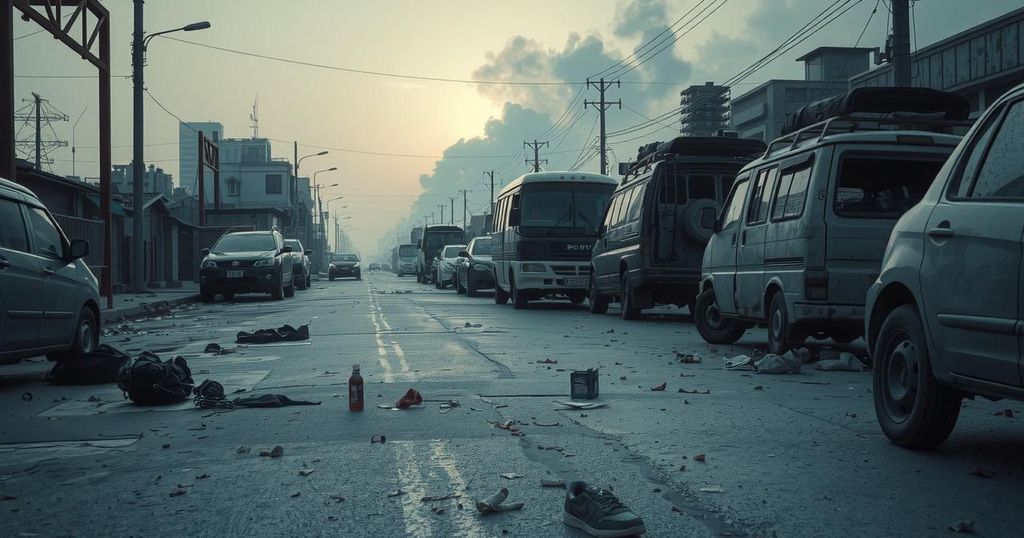Renewed Conflict in the DRC: M23 Insurgency Sparks Humanitarian Crisis

The Democratic Republic of Congo faces a resurgence of violence led by the M23 rebel group, escalating a long-standing conflict as Goma’s residents suffer severe humanitarian consequences. President Tshisekedi vows to reclaim territory while the world’s response remains tepid amidst the risk of broader regional instability. The conflict, deeply rooted in historical ethnic tensions, highlights the DRC’s significant mineral wealth and the geopolitical implications involving China and Rwanda.
A severe resurgence of violence has emerged in the Democratic Republic of Congo (DRC), fueled by the M23 rebel group, which seeks to strengthen its territorial control. Following their takeover of Goma, the situation has escalated with warnings from the United Nations about a potential regional war. President Félix Tshisekedi has declared efforts to reclaim national territory, characterizing the M23’s actions as a major threat, with corpses found in the streets of Goma as humanitarian catastrophes unfold.
The DRC has a long history of conflict, particularly following its independence from Belgium in 1960. The recent hostilities have intensified, particularly over the last three years, leading to widespread displacement of over 400,000 people and endangering the lives of United Nations peacekeepers. The current situation mirrors the traumatic conflicts of the late 1990s, where millions died, highlighting the fraught relationship between the DRC and Rwanda in these ongoing hostilities.
International response has been cautious amid the rising violence, with countries like Romania suffering humiliating defeats. Demonstrations against perceived inaction from the global community led to the torching of foreign embassies in Kinshasa. Notably, U.S. President Trump has described the crisis as a significant issue, leading to advisories for citizens to evacuate, yet Western nations demonstrate a muted reaction to the crisis that could shift geopolitical influence.
M23, primarily composed of ethnic Tutsi, has roots in the tensions stemming from the Rwandan genocide of 1994. Their current fight is framed as a struggle for ethnic rights against a backdrop of historical violence. The rebel group’s support from Rwanda has been a subject of contention, with accusations of military assistance, which Rwanda denies. The DRC government claims insufficient protection for ethnic Tutsis has fueled M23’s resurgence.
China’s interests loom large over the DRC’s mineral wealth, particularly cobalt, essential for global technology. Approximately 80% of the DRC’s cobalt output is controlled by Chinese enterprises, creating significant economic ties. Nonetheless, the ongoing conflict raises concerns about mineral extraction operations functioning without adequate security, prompting cautious observation from Beijing regarding the escalating situation.
Rwanda plays a complex role in the conflict as M23’s backers, yet with diminishing international support compared to past conflicts. Recent actions by Rwanda have enjoyed backing from Western countries due to their strategic significance. While Germany has halted meetings with Rwandan officials, overall, Rwanda continues to receive uninterrupted aid, and M23 shows no indications of retreating in its offensive, raising profound concerns about stability and humanitarian costs in the region.
The Democratic Republic of Congo, a nation marked by a historic cycle of violence and conflict, has faced renewed violence due to the M23 rebel group’s ambitions. This region is abundant in resources crucial for the global economy, yet it grapples with local and regional violence intertwined with ethnic tensions and international interests. The backdrop of colonial history and prior civil wars complicates current geopolitical dynamics, with various countries and organizations wary of the implications of this evolving crisis.
The ongoing conflict in the Democratic Republic of Congo, driven primarily by the M23 rebel insurgency, highlights long-standing ethnic tensions and geopolitical interests. The situation has ignited humanitarian crises, particularly in Goma, as international powers contemplate their response amid concerns of wider destabilization in the region. Despite various responses from global leaders, the DRC’s strategic mineral wealth ensures that its conflict remains a focal point of international attention, impacting global supply chains and regional geopolitics.
Original Source: www.nbcnews.com








